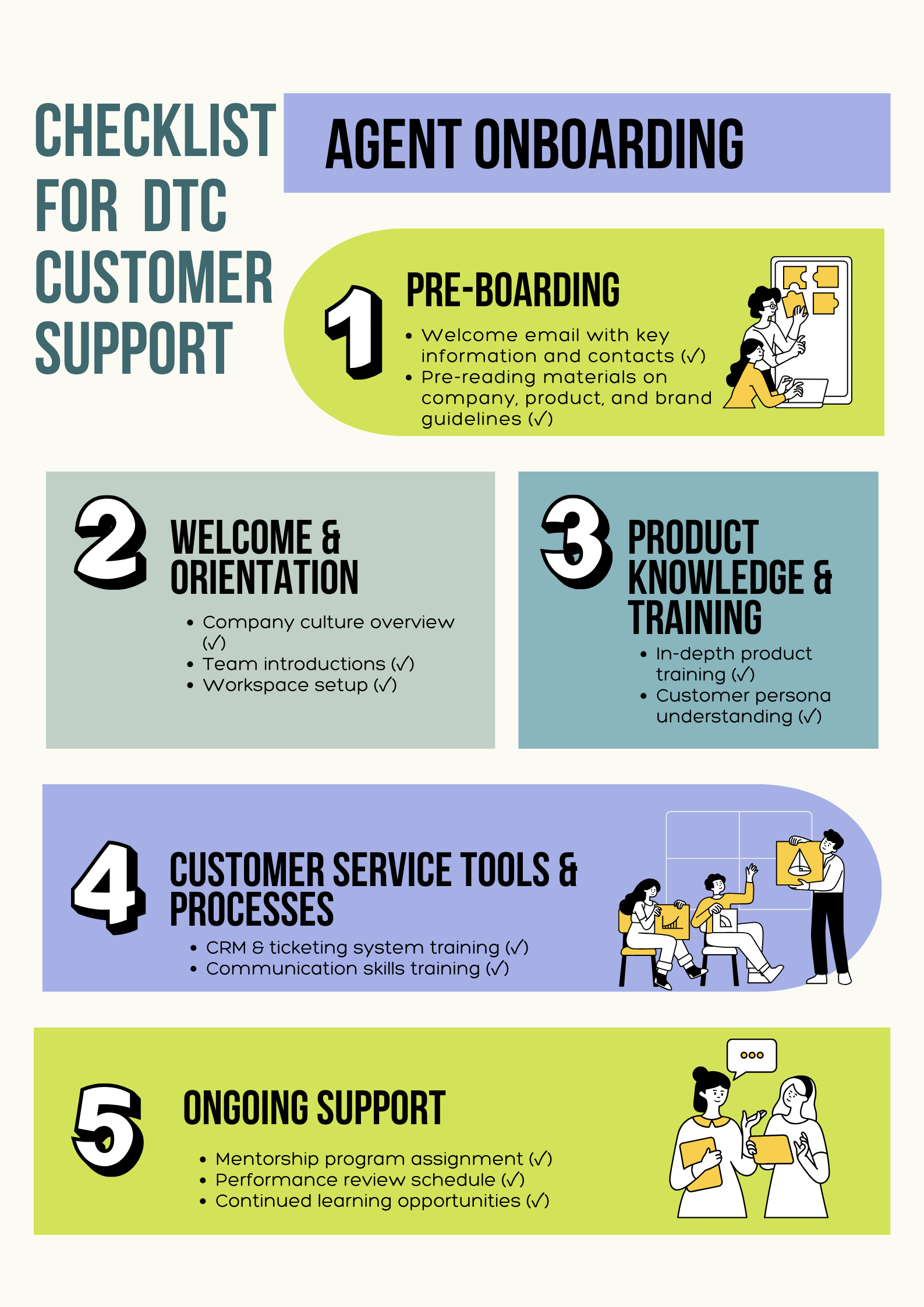Comprehensive Checklist for Onboarding a Customer Support Agent
Boost DTC customer support & loyalty! ✅ Our guide provides steps & checklists to onboard & train agents for success. Improve CSAT & retention. #customerservice #onboarding

Customer service agents are the frontline heroes of any DTC (Direct-to-Consumer) brand. They are the voice that builds trust, resolves issues, and ultimately fosters customer loyalty. But with a reported average annual turnover rate of 24% for customer service agents [Source: The Center for American Progress], ensuring a smooth onboarding process is crucial for retaining top talent and delivering exceptional customer experiences.
This blog post provides DTC brand owners and CXOs with a comprehensive guide to onboarding customer support agents. We'll delve into the importance of onboarding, outline key steps, explore best practices, and provide a handy checklist to streamline the process.
Key Takeaways
- Why Onboarding Customer Support Agents Matters
- 5 Best Practices for Onboarding Customer Support Agents
- Steps for Onboarding Customer Support Agents
- Agent Onboarding Checklist for DTC Customer Support
Why Onboarding Customer Support Agents Matters
Investing in a well-structured onboarding program goes far beyond simply filling a seat. Here's why it matters:
- Boosts Retention: A study by BambooHR revealed that new hires who go through a structured onboarding program are 58% more likely to be with the company after one year [Source: BambooHR]. Proper onboarding equips agents with the knowledge and confidence they need to succeed, reducing frustration and increasing retention.
- Improves Customer Satisfaction: Satisfied agents translate to satisfied customers. Onboarding equips agents with the skills to effectively resolve customer issues, leading to higher customer satisfaction scores and positive brand perception.
- Increases Productivity: Onboarding gets agents up to speed quickly, minimizing the time it takes them to become productive members of the team. This translates to faster issue resolution and improved overall efficiency.
- Enhances Brand Advocacy: A positive onboarding experience fosters a sense of belonging and loyalty. Well-trained agents become brand advocates, enthusiastically representing the company and its values to customers.
5 Best Practices for Onboarding Customer Support Agents
- Personalize the Experience: Tailor the onboarding program to the individual's needs and background. This demonstrates a genuine interest in their success and fosters a sense of value.
- Focus on Soft Skills: While product knowledge is essential, don't neglect the importance of soft skills like empathy, communication, and problem-solving. These skills are crucial for building positive rapport and effectively resolving customer issues.
- Gather Feedback: Regularly solicit feedback from new agents to gauge their understanding and identify areas for improvement within the onboarding program.
- Celebrate Successes: Recognize and celebrate the agent's achievements, both big and small, throughout the onboarding process. This reinforces positive behavior and boosts morale.
- Promote Team Building: Facilitate team-building activities to encourage collaboration, communication, and problem-solving.
Steps for Onboarding Customer Support Agents
A successful onboarding program should be a multi-faceted experience. Here's a breakdown of the key steps:
Pre-boarding:
- Offer Acceptance: Send a welcome email outlining the onboarding process timeline, key contacts, and any prerequisite tasks (e.g., completing online forms).
- Equipment Setup: Ensure the agent has the necessary equipment (laptop, headset) ready for their first day.
Day 1:
- Welcome and Introductions: Greet the agent warmly, conduct a team introduction, and provide a tour of the workspace.
- Company Culture: Immerse the agent in your brand's culture, values, and mission. This fosters a sense of belonging and aligns them with the company's goals.
- Customer Journey: Map out the typical customer journey, including common touchpoints and pain points. This understanding equips agents to anticipate customer needs and deliver exceptional service.
Week 1-2:
- Product Knowledge: Provide in-depth training on your DTC products and services. This includes features, functionalities, troubleshooting common issues, and best practices for product usage.
- Customer Support Tools: Train agents on the various tools and software used for handling customer inquiries (e.g., ticketing system, live chat platform).
- Customer Service Principles: Equip agents with customer service best practices, focusing on active listening, empathy, effective communication, and conflict resolution techniques.
Week 3-4:
- Role-Playing and Simulations: Facilitate role-playing exercises and simulations to allow agents to practice resolving customer issues in a safe environment. Provide constructive feedback for improvement.
- Performance Management: Introduce the performance evaluation process and key metrics used to assess customer service success.
- Mentorship: Assign a mentor to provide ongoing guidance and support to the new agent. This fosters a sense of community and facilitates faster integration into the team.
Continuous Learning:
- Knowledge Base Access: Provide access to a comprehensive knowledge base containing resources, FAQs, and solutions to common customer issues.
- Ongoing Training: Offer ongoing training opportunities to keep agents updated on product changes, industry trends, and best practices.
Agent Onboarding Checklist for DTC Customer Support

Additional Tips
- Create an onboarding buddy program: Pair new agents with experienced agents for peer support and knowledge sharing.
- Utilize gamification elements: Integrate gamification elements like points or badges to keep the onboarding process engaging.
- Gather feedback through surveys or one-on-one meetings.
- Provide resources for mental health and well-being: Acknowledge the emotional demands of customer service and offer resources to support agent well-being.
By implementing these steps, best practices, and the provided checklist, you can create a comprehensive onboarding program that equips your customer support agents with the knowledge, skills, and confidence they need to thrive. Remember, well-trained and supported agents are the foundation of exceptional customer experiences, ultimately driving customer loyalty and brand success.
Ready to take back your time and focus on what matters most? Kim virtual assistants are the perfect solution for DTC businesses. Book a demo today and see how Kim can help you achieve your business goals!



